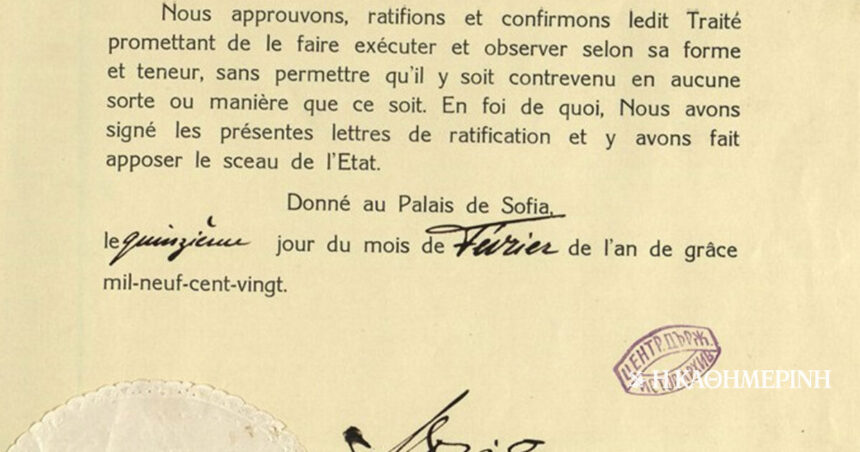The Balkan Wars led to the overthrow of Ottoman rule in Balkan Peninsula. Greece, Serbia and Romania (in the Second Balkan War) set as the main goal of their policy either historical justice or the restoration of intra-Balkan balance. On the contrary, the Bulgariaobsessed with its hegemonic syndrome in the region, sought to obtain the lion’s share of the Ottoman territories in the Balkans, considering that the Bulgarians were in the majority of the population.
Bulgarian dreams of territorial sovereignty in the Balkans collapsed on the battlefields of the Second Balkan War, where they suffered a painful defeat. In the following years, the main goal of Bulgarian policy was the reversal of the decisions of the Treaty of Bucharest. Wishing to satisfy its territorial ambitions in the Balkans, Bulgaria entered World War I on the side of the Central Powers in the autumn of 1915. Although it achieved some successes on the battlefields, it even occupied some of its claimed territories (South Serbia, Eastern Macedonia), the Bulgarian army collapsed in September 1918coming under fire from the Allied Entente troops fighting on the Macedonian Front. On September 29, Bulgaria capitulated accepting the terms of the Entente allies.
In June 1919, the Treaty of Versailles was signed, which definitively ended the war of the Entente allies with Germany.
In January 1919, the Paris Conference to determine the peace regime began its work. A total of 32 state representatives took part, while the central figures were the leaders of the victorious powers, France Georges Clemenceauof the United Kingdom Loud Georgeof the USA Woodrow Wilson and Italy Vittorio Orlando. In June 1919, the Treaty of Versailles was signed, which definitively ended the war of the Entente allies with Germany. Then followed the signing of four more peace treaties with the other defeated countries of the First World War.
On November 14/27, 1919, between the victorious powers and Bulgaria, the Treaty of New Yorka legal text that has been characterized by the Bulgarian side as a national disaster. Under the terms of the treaty, Bulgaria was forced to concede to the Entente allies Western Thrace and in Serbia Stromnica, Charibrot and Bosilevgrad, cede South Dobruja to Romania, pay huge war indemnity to the allies and reduce the numerical strength of her army to a few thousand men.
Greek sovereignty in Thrace was confirmed by the Treaty of Sèvres.
According to the decisions of the San Remo conference in April 1919, Greece acquired the right of military occupation of Thrace, Western and Eastern, up to Tsataltza. Greek sovereignty in Thrace was confirmed by the Treaty of Sèvres (July 28/August 10, 1920). Although the terms of this Treaty were revised by the Treaty of Lausanne (July 24, 1923) and Eastern Thrace was ceded to Turkey, Greece retained its sovereignty over Western Thrace, because its status had been recognized in a special convention of August 10, 1920, being an annex to the Treaty of Sèvres and not part of its main body.
Column editor: Myrto Katsigera, Vassilis Minakakis, Antigoni-Despina Poimenidou, Athanasios Syroplakis




